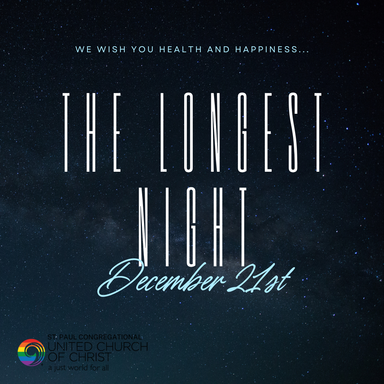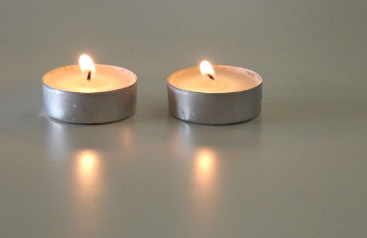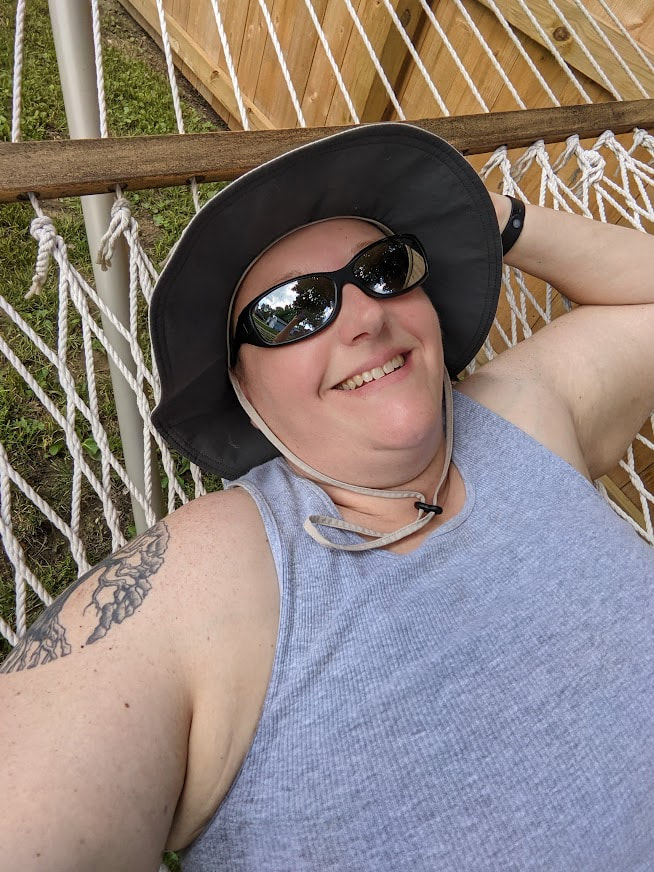 Tomorrow night is the longest night of the year. It’s the Winter Solstice, which, according to Jamie Carter at Live Science, will occur at 10:28 p.m. EST on Thursday, Dec. 21. Carter explains that, “Earth orbits the sun every 365 days while spinning on an axis tilted by 23.5 degrees. Its northern axis is tipped away from the sun on the winter solstice, resulting in the day with the fewest hours of daylight, and thus the longest night, all year in the Northern Hemisphere.” That’s the science of the Winter Solstice, but there is also a cultural aspect. I’ve written before about Yule, “The pre-Christian festival, the Feast of Juul, that was observed in Scandinavia at the time of the December solstice. Fires would be lit to symbolize the heat and light of the returning Sun and a Yule log was gathered and burnt in the hearth as a tribute to the Norse god Thor.” Modern Western Christians, too, have marked the longest night with “Blue Christmas” worship services for those who find that they are struggling during the holiday season due to a loss, illness, or other difficult life circumstances. Beyond celebrations and daylight hours, however, there is another–perhaps even more important–aspect of the longest night: Spiritual. We often miss how the longest night, and the shortest day, can speak to us on a spiritual level, but be assured, it does. So often this time of year, many of us have moments of anxiety, or fatigue, or even dread. We may be grieving the loss of someone we love who has died in the past year or in years gone by, but we might also just be a little sad for no apparent reason. On the longest night, it almost feels like the universe is giving nod to our weary spirits and our broken hearts. It almost feels like all of creation is a little colder, a little darker, a little more lonely in some way. It almost feels like the heavens and the earth are right there with us–a little sad for no apparent reason. But the Winter Solstice is far more than some universal, cosmic depression. It is the moment when transformation begins. From the exact moment that the solstice occurs–10:28 p.m. EST on Thursday, Dec. 21st–everything begins to change. No longer is the Northern Hemisphere tilting away from the sun–away from the light–it is now tilting toward it. With nights that grow increasingly shorter, and days increasingly longer–and all of the transformation in the natural world that comes with it. From the depths of darkness, something new begins to be born. As Christians, we see this message of transformational darkness happening in the stories of our faith. The darkness of the womb is the place where transformation begins for a world in desperate need of the One who would show us the Way. At Easter, too, we see yet another transformational moment beginning in the dark–new life springing from the darkness of the tomb. So, if you’re grieving this time of year. Or if you are anxious, weary, fearful, fatigued, or just generally sad, please hold onto the deep truth the Winter Solstice speaks to us: The darkness is not a destination, but the birthplace of transformation. It is the start of something, not the end. Light and warmth are being born from this cold, dark, long, and lonely night. So as we head into the Longest Night tomorrow night, I implore you, don’t ignore your darkness, and don’t try to pretend that it’s not there. Embrace it. Pay attention to it. Sit in it knowing that this is the place God chooses to enter into our human reality. God is here, and you are not alone. Sitting in the dark with you, Pr. Melissa  Recently, my spouse and I have been streaming our way through the “Friends” television series. I watched every episode when the series first aired on TV, and I have since seen every episode more times than I can count. However, this is officially my spouse’s first time through. Most evenings in our house lately, we will eat supper together, get done whatever chores or errands we need to do, then we will retire to the living room and watch 2 or 3 episodes of the sitcom (without commercials they’re only 20ish minutes each) before heading to bed for the night. Each night–without fail–I will find myself literally laughing out loud at some one-liner or some facial expression or humorous situation in a particular episode. And as I laugh each night–without fail–I will find myself looking across the room in my spouse’s direction, just to see if they are laughing too. To be sure, I’d find the show funny even if they weren’t laughing, but there’s something almost magical about those little moments when our eyes meet for a short time of shared laughter. I recently heard a colleague describe times like these as “micro moments”--moments that seem small or insignificant at the time but, steadily and over time, make a life. Micro moments have nothing to do with grand gestures or expensive vacations, but have everything to do with the most ordinary of details. Like knowing the way someone takes their coffee, or the way a couple who has read the Sunday paper for years divides the newspaper up into sections for each person to read without even having to think about it. Or Saturday mornings spent eating sugary cereal and watching cartoons with siblings, or enjoying Sunday chicken after church at Grandma and Grandpa’s house. Whatever the case, these micro moments don’t seem particularly special or significant while we are in them but, when we look back, are often the moments that stay with us the most. Which leads me to wonder if maybe–rather than only appreciating them in hindsight–we could figure out a way to be more present during these micro moments? Like, if these little moments are going to be the moments that stick with us and the moments that comprise our lives as individuals or our lives as part of other people’s lives, maybe we ought to practice being as present as we possibly can in those moments of laughter, or during those Sunday after church meals. Maybe–especially this time of year–when the pressure for the big gift or the big Christmas family get-together is at an all-time high–we could all pause and remember that it’s the little moments inside those BIG efforts that make it all worthwhile: A quiet evening after a day of holiday ruckus, a grandchild’s smile, the hand you get to hold while you watch others open their gifts, praying the same prayer before the holiday meal that has been prayed for generations. I don’t know if it would make any kind of difference at all, but I definitely want to spend what’s left of this Advent and Christmas season trying to find out. Maybe you’d like to join me in that endeavor? My hunch is that by being more intentional with our presence–mind, body, and spirit–we’ll find that those micro moments aren’t nearly as small and insignificant as we might see them now. In fact, they just might be the whole point. On the journey with you, Pr. Melissa |
Rev. Melissa Sternhagen
Rev. Melissa Sternhagen was called as the pastor of St. Paul Congregational UCC in June of 2020. Prior to her call to St. Paul, Pr. Melissa worked as a hospice chaplain in the Ames, IA area, following pastorates at rural churches in Central Iowa and Southern Illinois. Pr. Melissa is a second-career pastor with a background in agribusiness and production & supply operations. She received her M.Div. from Eden Theological Seminary in St. Louis, MO, and holds a MA Ed. in Adult Education and Training, and a BA in Organizational Communications. Archives
July 2024
Categories |

 RSS Feed
RSS Feed
